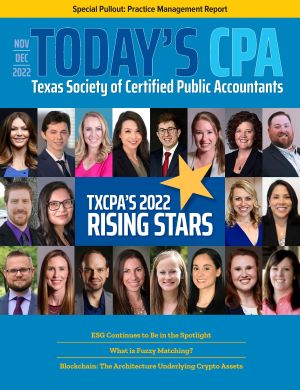ESG Continues to Be in the Spotlight as Regulators Move to Enforce Transparency
ACCOUNTING & AUDITING
By Don Carpenter, MSAcc/CPA
It is evident that the focus on environmental sustainability, climate change and equitable business practice is intensifying. We have featured issues related to this important area in the column twice this year (see “Sustainability Reports Rapidly Becoming Expected Disclosure” in the March/April issue and “SEC Proposes Controversial Rules Requiring Climate Related Disclosures” in the May/June issue).
Shareholders are increasing their demands regarding insight into the impact business decisions have on climate and the environment, as well as its effects on community structures and equity. In response, an emerging sector of the financial market is developing to allow investors to tailor their portfolios to meet their environmental, social and governance (ESG) priorities.
RELATED CPE:Webcast - ESG 101: What is Environmental, Social and Governance? |
Several recent enforcement actions on the part of governmental agencies spotlights the fact that as investors put emphasis on this area, regulators will as well. (See TXCPA’s 2022 Accounting Industry Outlook Report in the July/August Today’s CPA issue for insights on ESG initiatives.)
In April, the Federal Trade Commission levied penalties totaling $5.5 million against Wal-Mart, Inc. ($3.0 million) and Kohl’s, Inc. ($2.5 million) for marketing bamboo products as eco-friendly, which were in fact bamboo-derived rayon products. The environmental claims were the basis for the deceptive trade practice penalties as the process of converting the bamboo to rayon requires toxic chemicals resulting in harmful pollutants.
In addition to the penalties, the retailers have to cease claiming that the products are bamboo unless it can be substantiated and to stop marketing the products as environmentally friendly.
In May, on the heels of the FTC penalties, the Securities and Exchange Commission (SEC) assessed a $1.5 million penalty on BNY Mellon Investment Advisor for misstatements related to ESG targeted investment policies governing certain mutual funds. The case highlights the practice of “greenwashing” or asserting undocumented claims that products (in this case mutual funds) are environmentally friendly.
The advisor could not document that it had conducted the quality reviews it asserted had been made on funds purporting to contain environmentally responsible investments.
A week after the SEC penalty was announced, German authorities initiated a similar greenwashing investigation of DWS Group, the asset management subsidiary of Deutsche Bank AG, asserting investment fraud. Due to its relationship with U.S. markets, the SEC is joining in this investigation.
Concurrent with the announcement of the above penalty, the SEC also released two proposed rules addressing the substance of this issue. The first addresses misleading or deceptive fund names. Currently, if a fund name suggests that its focus is on a particular type of investment, it must adopt a policy to invest at least 80% of the fund’s value in such investments.
The proposed new rule would extend this requirement to include funds that target investments with specified characteristics. Such characteristics could include such terms as “value,” “growth” or “tax-exempt.” But it would also include characteristics referring to “environmental,” “social” or “governance” factors. The 80% requirement is determined at the time the fund makes an investment. If the 80% investment threshold is not met later, future investments must be made under a methodology that would bring the fund back into compliance.
The rule specifically discusses deceptive or misleading use of ESG terminology in fund names. The discussion focuses on “integration funds” that incorporate ESG factors alongside other non-ESG criteria. In many cases, the ESG factors carry no more weight than the other factors and are therefore not determinative. In such cases, using ESG terminology in a fund’s name would be deemed misleading.
A second rule would require investment advisors to provide more specific disclosures in fund prospectuses, annual reports and advisor brochures to address ESG strategies. If a fund is identified as seeking certain ESG impacts, it would be required to describe the specific impact, as well as regular updates on the progress toward that goal.
For example, if greenhouse gas emissions (GHG) were the focus of a particular fund, disclosure of the specific emissions, targeted reduction goals and regular disclosure as to the progress toward that goal would be required. Arguably GHG disclosure will become more readily available as the SEC requirements for registrant reporting on such emissions become effective (see May/June article referenced above).
As part of the additional disclosure, fund advisors would be required to give investors insight into how advisors use their influence with the portfolio companies to achieve the stated ESG goals. Generally, the advisors vote a major portion of the fund’s shares in the portfolio companies via proxy.
In addition, they may meet with management of the companies. If either proxy or management meetings are deemed significant to achieving the fund strategy, the fund must also disclose how it engages with the portfolio companies to achieve its objectives.
Also in May, the Financial Accounting Standards Board (FASB) announced that it is considering new rules regarding accounting for financial instruments with ESG features or credits. The project will address recognition, measurement and disclosure for programs that generate ESG related credits such as cap-and-trade, carbon offset credits or renewable energy credits. The scope will initially be limited to credits that can be traded and excludes tax credits or incentives.
It is apparent that a new level of complexity is rapidly emerging with regard to the impacts businesses have on society and the environment. Enterprises would be well served to understand the implications of these new rules and regulations on their operations, perception of these operations with customers and suppliers, and their ability to raise capital.
About the Author: Don Carpenter is clinical professor of accounting at Baylor University. Contact him at Don_Carpenter@baylor.edu.






















